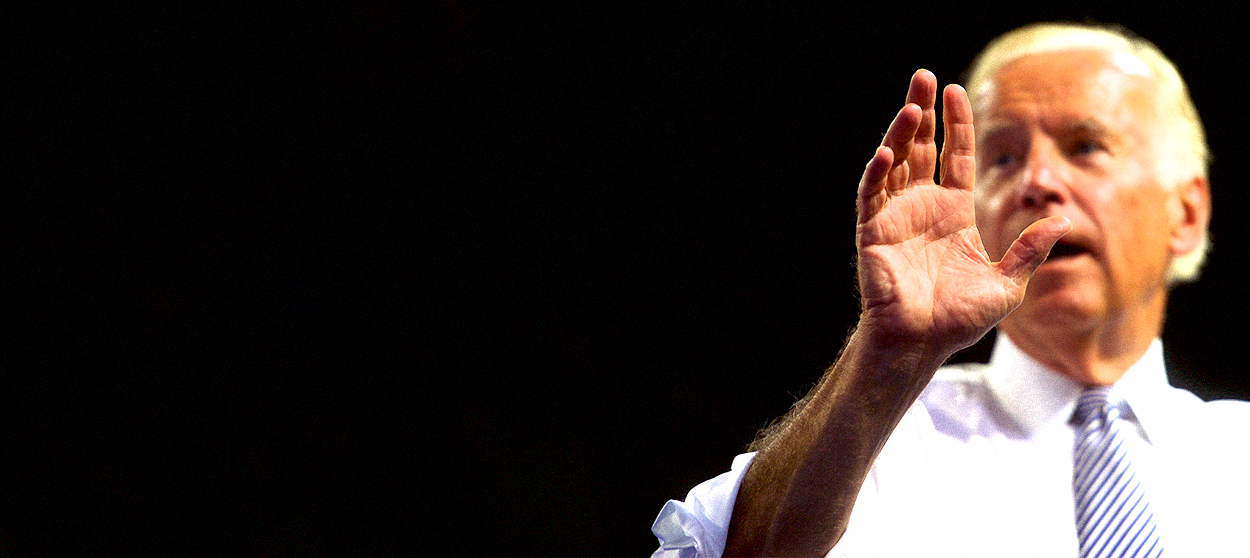Joe Biden doesn't get it
He just doesn't understand what it would take to fix America


A free daily email with the biggest news stories of the day – and the best features from TheWeek.com
You are now subscribed
Your newsletter sign-up was successful
Joe Biden is the most popular possible presidential candidate among Democrats so far. He shouldn't be.
Setting aside his awful political history, let's give a fair shake to his political views, which he outlined in detail in a speech at the Brookings Institution last year. His remarks demonstrate that while Biden is not quite the grotesque Big Finance stooge he was in his early career, his ideas about political economy are badly mistaken and out of date. He just is not a good fit for the United States in 2020.
First, the good. Biden recognizes that for too many Americans, things are not going so well. Wages are relatively flat, while the price of a college education, health care, and housing are increasing seemingly without end. "People stopped believing in the American dream," he says, and for completely logical reasons.
The Week
Escape your echo chamber. Get the facts behind the news, plus analysis from multiple perspectives.

Sign up for The Week's Free Newsletters
From our morning news briefing to a weekly Good News Newsletter, get the best of The Week delivered directly to your inbox.
From our morning news briefing to a weekly Good News Newsletter, get the best of The Week delivered directly to your inbox.
Biden also has some good ideas. He argues that community college should definitely be free and argues the $6 billion cost can easily be raised by getting rid of an unjustifiable tax loophole for the moderately rich. (He says state universities should be free as well, but doesn't say how to pay for it.) He argues that America badly needs an overhaul of its basic infrastructure, to at least match the standards of Western Europe, Japan, South Korea, or China.
All of this is basically fine, if not quite as aggressive as I would prefer.
But now, the bad. Biden's focus on education is part of a deeply discredited model of labor income. He argues that wages are low in part because workers aren't getting enough education: "[B]y the end of this decade 6 in 10 jobs are going to need some training, some education beyond high school or you're not going to make it."
The idea here is that of "human capital" — that some workers are making more because they have the skills to work at better-paying jobs, and some do not. Therefore we should increase educational attainment to reduce inequality. Sounds plausible, except for the minor problem that it's clearly not true at all. As economist Marshall Steinbaum explains, "when you hold educational attainment and other observable worker characteristics constant, pay is starkly different depending on the firm where you work, even within narrowly-defined education categories, industries, and occupations." Whoops!
A free daily email with the biggest news stories of the day – and the best features from TheWeek.com
Indeed, the weakness of this point can be seen from Biden himself, when he argues that "if you graduated with a PhD in astrophysics, if you don't go back for education you're obsolete in 10 years." Dude, what? What are you supposed to do, go get another PhD?
In reality, wages are low because that is how the labor system has been deliberately structured. (Incidentally, this is why the effort to decrease poverty by boosting education was also a categorical failure.) The minimum wage has not kept up with inflation, and the economy has been run below top speed since the 1980s. With the brief exception of the late '90s, whenever it looks as though workers might get pricing power, the Fed has jacked up interest rates, creating a downward ratchet on the labor share of income. Meanwhile, lower taxes on the top income brackets and capital income have incentivized shareholders and executives to redirect most of the corporate surplus towards themselves and away from workers, R&D, and investment.
If we structured our labor system morally, even the lowest-status workers in food service and such would make a decent wage. Biden actually gets a small part of this when he talks about sandwich workers being forced to sign non-compete agreements, which are indeed very bad. But he does not once mention the major reason why the working class has been run down over the years: the decline of unions. Collective representation has been by far the most effective way for workers to get decent pay and decent working conditions. (They largely don't exist anymore in the private sector in part because Biden himself stood aside while they were destroyed by deregulation and anti-worker trade deals. He had the worst AFL-CIO rating of any Democratic candidate for president in 2008.)
He laments high inequality, but qualifies that soaking the rich isn't the way to do it. "I don't think 500 billionaires are the reason why we're in trouble." Instead we should reform the tax code by getting rid of some tax deductions, and adding means tests to Social Security and Medicare. "Paul Ryan was correct when he did the tax code. What's the first thing he decided we had to go after? Social Security and Medicare … That's the only way you can find room to pay for it."
All in all, its a bleary recognition of some of the problems besetting America, with a lot of quarter- and eighth-measure solutions that are plainly inadequate to the task, coupled to some abysmal ideas like cutting social insurance programs. So where does he get these ideas? Let Biden speak for himself: "I traveled the country meeting with major CEOs. Between Penny Pritzker and I, we interviewed over 340 CEOs in the top 500 corporations … And the overwhelming message we received from the business community is the same one you've received: We need a better educated workforce."
They would say that, wouldn't they? Because the plainly obvious fact is that 500 billionaires (and the rest of the top 1 percent) are a huge part of why we're in trouble. They constitute an oligarchy, which dominates politics and uses their control over the levers of policy to enrich themselves and keep the working class down. Biden can't see this, perhaps because he has been ideologically indoctrinated, or perhaps because he is personally too close to the oligarchs.
America must do better than heavily compromised, penny-ante liberalism in 2020.
Ryan Cooper is a national correspondent at TheWeek.com. His work has appeared in the Washington Monthly, The New Republic, and the Washington Post.
-
 The environmental cost of GLP-1s
The environmental cost of GLP-1sThe explainer Producing the drugs is a dirty process
-
 Greenland’s capital becomes ground zero for the country’s diplomatic straits
Greenland’s capital becomes ground zero for the country’s diplomatic straitsIN THE SPOTLIGHT A flurry of new consular activity in Nuuk shows how important Greenland has become to Europeans’ anxiety about American imperialism
-
 ‘This is something that happens all too often’
‘This is something that happens all too often’Instant Opinion Opinion, comment and editorials of the day
-
 The ‘mad king’: has Trump finally lost it?
The ‘mad king’: has Trump finally lost it?Talking Point Rambling speeches, wind turbine obsession, and an ‘unhinged’ letter to Norway’s prime minister have caused concern whether the rest of his term is ‘sustainable’
-
 The billionaires’ wealth tax: a catastrophe for California?
The billionaires’ wealth tax: a catastrophe for California?Talking Point Peter Thiel and Larry Page preparing to change state residency
-
 Bari Weiss’ ‘60 Minutes’ scandal is about more than one report
Bari Weiss’ ‘60 Minutes’ scandal is about more than one reportIN THE SPOTLIGHT By blocking an approved segment on a controversial prison holding US deportees in El Salvador, the editor-in-chief of CBS News has become the main story
-
 Memo signals Trump review of 233k refugees
Memo signals Trump review of 233k refugeesSpeed Read The memo also ordered all green card applications for the refugees to be halted
-
 Has Zohran Mamdani shown the Democrats how to win again?
Has Zohran Mamdani shown the Democrats how to win again?Today’s Big Question New York City mayoral election touted as victory for left-wing populists but moderate centrist wins elsewhere present more complex path for Democratic Party
-
 Millions turn out for anti-Trump ‘No Kings’ rallies
Millions turn out for anti-Trump ‘No Kings’ ralliesSpeed Read An estimated 7 million people participated, 2 million more than at the first ‘No Kings’ protest in June
-
 Democrats: Harris and Biden’s blame game
Democrats: Harris and Biden’s blame gameFeature Kamala Harris’ new memoir reveals frustrations over Biden’s reelection bid and her time as vice president
-
 ‘We must empower young athletes with the knowledge to stay safe’
‘We must empower young athletes with the knowledge to stay safe’Instant Opinion Opinion, comment and editorials of the day
